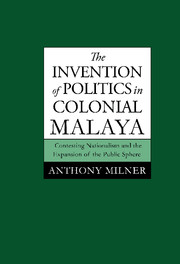 The Invention of Politics in Colonial Malaya
The Invention of Politics in Colonial Malaya Book contents
- Frontmatter
- Contents
- Preface
- Map of Malaya
- Introduction: Colonialism, Nationalism and Contest
- 1 The Ancien Régime: Described and Condemned
- 2 Establishing a Liberal Critique
- 3 A Description of the Real World: Expanding Vocabularies
- 4 Conceptualizing a Bangsa Community: A Newspaper of Moderate Opinions
- 5 Building a Bourgeois Public Sphere
- 6 Ideological Challenge on a Second Front: The Kerajaan in Contest with Islam
- 7 Answering Liberalism: Islamic First Moves
- 8 Kerajaan Self-reform: Chronicling a New Sultanate
- 9 Practising Politics in the Mid-Colonial Period
- 10 Surveying the Homeland: Sedar and Dialogic Processes
- Conclusion: The Malay Political Heritage
- Select Bibliography
- Index
Introduction: Colonialism, Nationalism and Contest
Published online by Cambridge University Press: 18 December 2009
- Frontmatter
- Contents
- Preface
- Map of Malaya
- Introduction: Colonialism, Nationalism and Contest
- 1 The Ancien Régime: Described and Condemned
- 2 Establishing a Liberal Critique
- 3 A Description of the Real World: Expanding Vocabularies
- 4 Conceptualizing a Bangsa Community: A Newspaper of Moderate Opinions
- 5 Building a Bourgeois Public Sphere
- 6 Ideological Challenge on a Second Front: The Kerajaan in Contest with Islam
- 7 Answering Liberalism: Islamic First Moves
- 8 Kerajaan Self-reform: Chronicling a New Sultanate
- 9 Practising Politics in the Mid-Colonial Period
- 10 Surveying the Homeland: Sedar and Dialogic Processes
- Conclusion: The Malay Political Heritage
- Select Bibliography
- Index
Summary
The revolutions erupting through Eastern Europe late in 1989 raised questions as well as hopes, and one of these questions concerns the concept of ‘polities’. Several commentators remarked that the people of post-communist states would need to learn not just about the art of democracy but also about the practice of politics. ‘Polities’, it would seem, was viewed by such commentators as a preliminary step toward mastering that higher art. For many of us who read judgements of this type, however, the very notion of an absence of politics is puzzling.
We live in an age of politics. Just as the mediaeval European considered “every activity, every day” to be “saturated with religion” (thus making ‘unbelief’ inconceivable), so we in the late twentieth century possess a fundamentally political outlook. We tend to attribute a political significance, often a political motivation, to virtually every action no matter in what type of society or in what period of history that action may have occurred. We take for granted, as the anthropologist Louis Dumont has complained, that all communities “have politics”, in the sense that they consist of individuals maximizing their advantages and manipulating their situations. We assume that each polity represents the sum total of the ‘rational’ political manoeuvrings of its individual citizens.
Possessing such assumptions it is easy to neglect that transition in European history when people began to see themselves as homo politicus. Even in the study of ‘political development’, we tend to accept the concept ‘political’ as a given, rarely seeking to define or dissect it.
- Type
- Chapter
- Information
- The Invention of Politics in Colonial MalayaContesting Nationalism and the Expansion of the Public Sphere, pp. 1 - 9Publisher: Cambridge University PressPrint publication year: 1995


